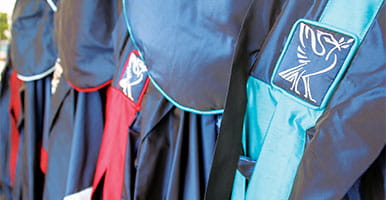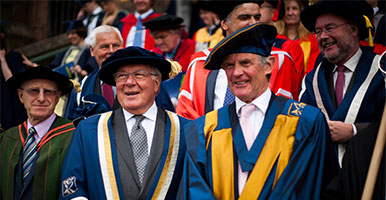Professor Francisco Sánchez Martínez
Presented by Professor Peter Wheeler
Honourable Pro-Chancellor, I have pleasure in presenting Professor Francisco Sánchez Martínez for the award of an Honorary Fellowship from Liverpool John Moores University.
Each July during Graduation Week, the University's highest honour – an Honorary Fellowship – is bestowed on a select band of individuals outside the University, in recognition of their outstanding achievement in a given field or profession, and who personify and inspire others to 'dream, plan, and achieve.'
We propose Professor Martínez today for his outstanding contribution to the field of astrophysics. He has used his position as Spain's foremost astronomer to pioneer and establish astrophysics as a scientific discipline in his own country and has created the European Northern Observatory on the Canary Islands, to the great benefit of the international scientific community.
Born in Toledo in 1936, Professor Martínez has dedicated his life to the study of astronomy and astrophysics. Although best-known for its natural attractions and subtropical climate, which draw millions of visitors to its shores each year, the Canary Islands have hosted telescopes and astrophysicists for almost 50 years.
Professor Martínez was the first to recognise that the location of the high mountains of these islands makes them ideal for astronomical observation. He founded the Instituto de Astrofísica de Canarias (IAC) in 1975 at the University of La Laguna, Tenerife and subsequently established two observatories – the Teide Observatory on the island of Tenerife and the Roque de los Muchachos Observatory on La Palma. These are now home to instruments belonging to 60 scientific institutions from 18 countries. They include one of the world's largest single aperture optical telescopes, the 10.4m large Canary Islands Telescope, which formally opened in 2009.
Professor Martínez played a pivotal role in the design and construction of this £112 million project, which involved 1,000 people from more than 100 organisations and took more than 20 years to complete. Sited among these instruments, high on a mountain on La Palma is, of course, the fully robotic 2.0 Liverpool Telescope, designed and operated by the Astrophysics Research Institute here at LJMU.
Celebrating its 10th anniversary of operation this month, it has enabled our staff and students to conduct pioneering research at the frontiers of science in areas such as supernovae and planets beyond our solar system, as well as inspiring future scientists and engineers through the National Schools' Observatory.
Scholarship and scientific outreach is one of the principal aims of the IAC and there is a focus on developing the next generation of astrophysicists. He trained the first cohorts of Spanish astrophysicists and created its first research groups.
It is testimony to his dedication that astrophysics is now one of Spain's most productive scientific disciplines in terms of publications, and the discipline with the greatest international impact. Professor Martínez sits on the Organising Committee of the IAC's annual Canary Islands Winter School of Astrophysics, which for almost 25 years has welcomed postgraduate scholars from all over the world to explore the application of gravitational lenses in astrophysics and cosmology.
He has authored over 100 scientific papers and been involved indirectly with many more. He is a Visiting Professor and Director of several astrophysics courses at universities in Spain and overseas, and keenly promotes the technologies underpinning the construction of research instrumentation to industry. His research, scholarship and knowledge transfer activities have earned him over 20 international awards and he is a member of over 15 national and international research societies, including the International Astronomical Union and the American Astronomical Society.
Thus, it is with great pleasure that I present Professor Francisco Sánchez Martínez, this most distinguished adopted son of our city and a living embodiment of the University ethos to Dream, Plan Achieve, for admission to our highest honour, as an Honorary Fellow of Liverpool John Moores University.



